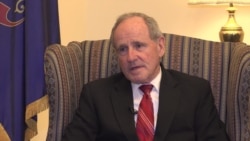North Korean leader Kim Jong Un must realize that Donald Trump is a "very different" U.S. president with a different policy than that of the previous administration, an influential U.S. lawmaker says.
"Kim Jong Un is dealing with a very different person in President Trump," Republican Senator James Risch of Idaho told VOA's Korean Service. "He's not dealing with President Obama anymore."
Risch, who attended the recent Winter Olympics as a member of the U.S. delegation to the closing ceremony, serves on the Senate Foreign Relations Committee. Before leaving for Pyeongchang, South Korea, he warned experts at an international security conference in Munich, Germany, that in the event that there is war between the United States and North Korea, it "will be of biblical proportions."
Risch will likely become committee chair if Republicans maintain control of the Senate and the current chair, Bob Corker of Tennessee, retires as he has said he will.
"President Trump is dedicated to protecting the United States homeland, protecting our allies, protecting Americans that are in other parts of the world," Risch told VOA. "He is going to do what's necessary to see that happens."
He added that it is critical for Kim, who is developing nuclear-tipped intercontinental ballistic missiles (ICBMs) capable of striking the continental U.S., to "come to his senses and realize that it's in his best interest, in his regime's best interest, if they want to survive as a regime, that he should choose the option of denuclearization on the peninsula."
Since the Olympics overture between the two Koreas, there's been growing concern in Washington that Seoul's approach toward Pyongyang could undermine Trump's effort to apply what he calls "maximum pressure" through the imposition of sanctions aimed at forcing Kim to give up nuclear weapons.
Risch, however, confirmed that he received a reassurance from Moon that the inter-Korean Olympic thaw will not undermine sanctions imposed against North Korea.
Trump announced Feb. 23 what he called "the largest ever" package of sanctions against North Korea. At the time, he warned that if the latest sanctions fail to compel Kim to show willingness to denuclearize, the U.S. will enter phase two of its policy, suggesting the U.S. might use an option it has long held in reserve — military force.
Risch said, "We hope we don't have to define what phase two means, but people will know when they see it. There's no question about that."
He dismissed the often cited "bloody nose strategy," or what is more commonly known as limited military surgical strikes, as "some kind of a slap on the wrist" and "the least, smallest thing you can possibly do militarily." Instead, the senator said the military option that the U.S. has in mind is larger.
Prior to visiting South Korea, Risch attended the Munich Security Conference on February 18. While there, he said war with North Korea could result in "probably one of the worst catastrophic events in the history of our civilization. … The end of it is going to see mass casualties the likes of which the planet has never seen. It will be of biblical proportions."
Risch's remarks before the Olympics came amid growing calls for preemptive military strikes against North Korea by hardliners in Washington.
John Bolton, a former U.S. ambassador to the United Nations during President George W. Bush's administration, told VOA Korean this week, "I think, obviously, if there's going to be military action, it has to be before North Korea is able to hit targets in the United States. So there's not much time. That's for sure."
CIA Director Mike Pompeo said in January that North Korea may be able to obtain the ICBM technology to hit at least some of the U.S. mainland in "a handful of months."
When pressed with a question about the time frame of a possible U.S. military strike against North Korea, Risch tried to avoid answering several times, only to say, "I can't reveal any details like that. And, as you know, the president has said consistently as the commander in chief, he will not telegraph when and how he's going to do this."
Although Trump left open the possibility for talks with North Korea, "only under the right conditions," the U.S. military held a so-called classified "tabletop exercise" last week in Hawaii that examined how to mobilize American troops if a potential war on the Korean Peninsula is ordered. According to The New York Times, which reported on the exercise, "Pentagon officials cautioned that the planning does not mean that a decision has been made to go to war" over U.S. demands that North Korea curtail its nuclear ambitions.
Christy Lee contributed to this report, which first appeared on VOA Korean





